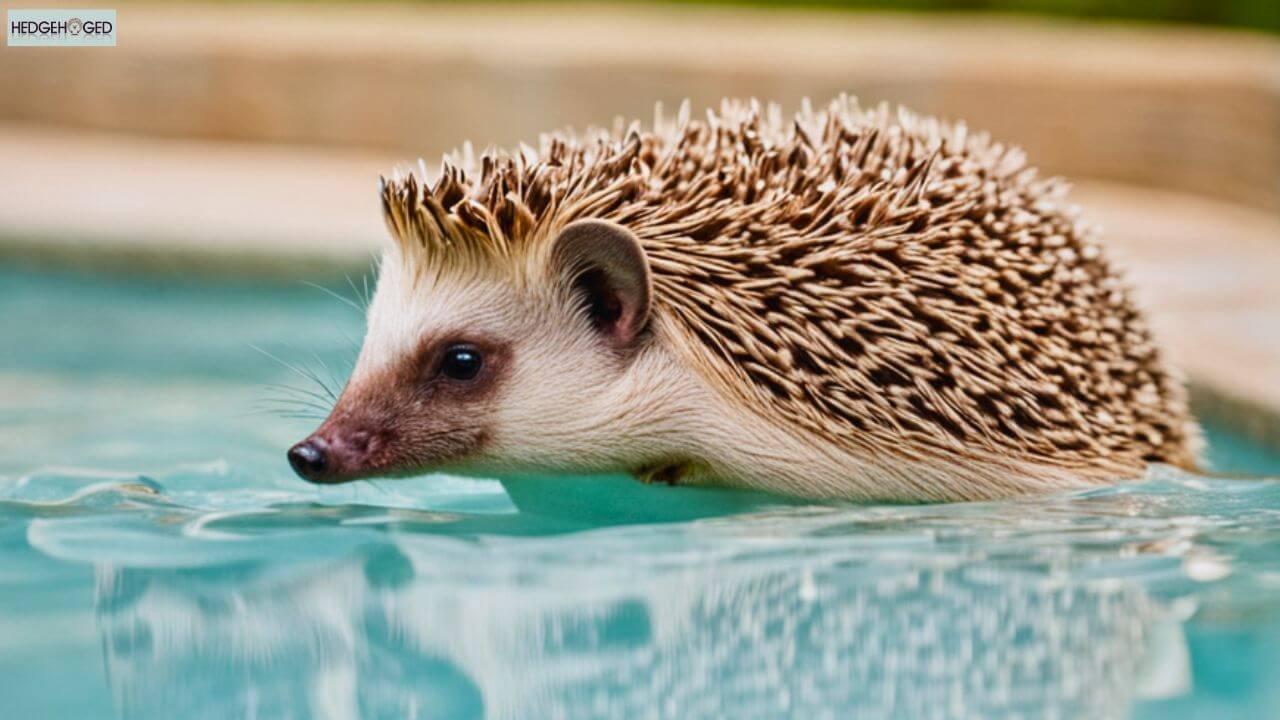Despite their growing popularity and excellent pet status, many hedgehog owners need to be aware of their swimming ability. On the other hand their diminutive size, these animals are covered in sharp air-filled quills. If they fall into the water, this helps them float.
Therefore, the answer is generally yes! The majority of hedgehogs can swim rather effectively. It doesn’t, however, exclude the possibility that should they be unable to climb back out of a steep pool or bank, this delicate creature may be harmed or perhaps die. Another bad thing that could happen is that they bump their head or be hurt in another way.
It should be possible for any hedgehog to swim, however it’s up to them whether or not they choose to (more on that later).
Can Hedgehogs Swim?
Since hedgehogs are nocturnal animals that spend most of their activity time in the shadow of the night, it is an often-asked question whether or not they can swim. Hedgehogs can swim astonishingly well, both in the wild and in captivity but only in specific types of water.
Strong currents would make them struggle, therefore they need to have a ledge or other platform that makes getting in and out of the water easy. A hedgehog shouldn’t swim in swimming pools or ponds. If you own a hedgehog as a pet, you must make sure it is accessible, or else you risk leaving your spiky little buddy stranded and in danger.
It’s well known that certain hedgehog breeds are stronger swimmers than others. Below are the top four breeds of hedgehogs that are known to swim:
- European and African Pygmy Hedgehogs (this is the most popular kind kept as pets)
- The Long-Eared Hedgehog of India
- Long-Eared Hedgehog of Egypt
It should be mentioned that different people may find swimming more challenging for different reasons. The weight, height, gender, and breed of the hedgehog are some of these variables.
Do Hedgehogs Like to Swim?
Now that we know hedgehogs can swim, let’s find out how much of a pleasure it is for them. The distinctive and lovable hedgie in your home will decide whether or not it enjoys a cool swim in the water. In terms of preference, it’s important to note that some hedgehogs could be terrified or intimidated by the water as a result of a negative encounter in the past.
A hedgehog might experience stress simply from the unknown elements of this novel circumstance. These hedgehogs will typically stay on land because of these worries. Nevertheless, other hedgehogs will jump straight in and not worry about anything!
When swimming for the first time, hedgehogs tend to be a little hesitant. Therefore, don’t be alarmed if your hedgehog trembles, flinches, arches up its spine, or poops in the pool or another body of water at that very moment. These are all rather typical occurrences.
Can Hedgehogs Swim In Pools?
Even though they can swim well, hedgehogs require an accessible ledge to enter and exit the water. For this reason, creeks and rivers provide excellent locations for hedgehog pool parties. However, ledges in artificial swimming pools and ponds may be too steep for hedgehogs to scale. Observe any troubled hedgehogs if you own a pool.
Even worse are swimming pools, which typically feature walls that are entirely vertical with coping stones dangling over the edge. Thus, despite the hedgehog’s ability to swim and float when fatigued. He eventually won’t be able to keep his head above water and will drown if he is left in a pool or pond for an extended period.
Can Hedgehogs Swim Underwater?
Even though they can swim, hedgehogs are not well suited for swimming underwater. They lack particular adaptations for sustained underwater activity, in contrast to several aquatic animals. Rather than diving underwater, hedgehogs would usually attempt to stay floating and navigate on the water’s surface.
When in the water, their main goal is to use their air-filled quills to stay buoyant and, if needed, travel in the direction of safety or food sources. Nevertheless, they are ill-suited for extended immersion and will naturally attempt to maintain their head above the water.
Hedgehogs can therefore swim through water, but unlike amphibians like frogs and turtles, they are not designed for prolonged submersion.
How Fast Can Hedgehogs Swim?
In the water, hedgehogs are not renowned for their quickness. Even though they are proficient swimmers, they usually move slowly and steadily. When swimming, they are more concerned with keeping afloat and navigating than they are with swimming fast.
Depending on their size, physical state, and the current of the body of water they are in, their speed in the water can change. Hedgehogs aren’t thought to be very good swimmers, nevertheless, in contrast to other aquatic creatures.
How Long Can Hedgehogs Swim?
Although hedgehogs can swim a short distance, they are not built to stay in the water for extended periods. The length of time someone can swim is determined by several variables, including their level of fatigue, the water’s temperature, and their physical state.
Hedgehogs typically only swim as far as is required to get to safety or food sources, after which they will try to get out of the water. They are not designed to swim for extended periods, unlike fish and amphibians. Hedgehogs should never be left in the water for too long as this can cause fatigue, anxiety, and even drowning. Instead, they should be closely supervised when swimming and have easy access to land.
Hedgehog Ramp for Swimming Pool
Making a hedgehog ramp for a swimming pool is a sensible approach to protect small animals like hedgehogs from unintentionally falling into the water. Make sure that the side of your garden pond slopes slightly so that any hedgehog can escape.
Alternatively, you can construct a ramp using chicken wire or a comparable material to provide an escape path. Make sure that any swimming pools have a ramp leading out of them for any hedgehog that could fall in, or that they are covered securely.
Can Hedgehogs Climb?
To a certain extent, hedgehogs can climb, although they are not adept climbers and may run into problems, particularly on steep or slippery terrain. It is possible to keep hedgehogs from becoming stranded or hurt in dangerous areas by taking preventative measures in hedgehog-proof environments.
Hedgehogs seem to have no purpose for climbing, but they nevertheless do it. They can also climb uphill, but it’s much harder to go back down. This could be the reason they get stuck in attics, drainpipes, and roofs. Hedgehogs are completely incapable of scaling steep or slick terrain.
Can Hedgehogs Float?
Hedgehogs can float because their spines are made of hollow, air-filled tubes. If hedgehogs tire out while swimming, they can float on the water’s surface because of the air-filled tubes’ inherent buoyancy.
Hedgehogs frequently exhibit the behavior of floating on their backs when they need to rest or store energy while submerged in water. Hedgehogs’ capacity to float can protect them from fatigue and possible drowning when swimming.
Why Do Hedgehogs Swim?
Hedgehogs do swim as part of their nocturnal foraging routine. They will immediately dive in and swim across a body of water to acquire food if they scent it there. Not only may the water itself provide a drink, but it may also provide nourishment.
Many different kinds of insects can be drawn to a pond or stream, and hedgehogs will eat toads, newts, and frogs if they get the chance. There might even be fish served. In addition, rescuers utilize hydrotherapy to assist injured pigs regain muscle tone and devour hedgehog swimming ponds. Hedgehogs are generally quite comfortable in the water.
Hedgehog Saved From Swimming Pool
Generally, the answer is yes, but you should never leave your hedgehog alone in the pool. When your pet wants to get out of the water, make sure there is a ramp of some kind for him to clamber up on. Having a floating platform is also convenient for times when your little hedgie needs to stretch or warm up.
It’s crucial to understand that, in the event of danger, even hedgehogs who enjoy swimming may end up drowning. When it comes to deep pools or other outdoor water features with steeper sides that make it harder for your petite and endearing hedgehog to get out when the time is right, don’t leave them alone.
For the safety of your hedgehog when playing outside at night, it is best to cover any backyard pool or other water source. This may aid in averting mishaps. When your hedgehog is swimming outside, there’s also a chance that it could be attacked by surrounding wildlife or other neighborhood dogs.
When they sense danger, hedgehogs will freeze and roll onto their backs. Their air-filled quills foil this endeavor when submerged in water.
Can Hedgehog Babies Go Swimming?
Hedgehog babies can swim if given the chance. Always give them time to adjust to being in the water and let them go at their speed. Most pet owners believe that to stay clean, hedgehogs, whether young or old, require baths. That isn’t the case, though. Like cats, hedgehogs groom themselves extensively throughout the day and lick themselves clean.
However, if your hedgehog has gotten into something filthy, sticky, or smelly, it could occasionally be essential to wash him. It is essential to give your infant pet time to gain strength before letting them swim in deeper water. For young hedgehogs to pursue swimming lessons, they will require support and a peaceful setting.
You should never just toss your hedgehog into the sea. They may become quite afraid of this, and it may even lead to major health problems and stress.
Why Do So Many Hedgehogs Drown?
Despite their excellent swimming abilities, hedgehogs frequently get drowned in swimming pools and backyard ponds. Why does this occur?
There are several causes. To start with, hedgehogs aren’t very intelligent, and I don’t mean to be impolite. Thus, they don’t plan their routes very much. They don’t appear to stop to think about whether they will be able to escape when they dive into a pond or pool. Perhaps because their spines can cushion a fall onto a hard surface, hedgehogs don’t appear to be very afraid of falling.
However, because they have the same carefree mindset, they are content to jump from precarious objects, such as the edge of a swimming pool, without considering how they would get back. A natural escape route, such as beaches or gently sloping banks, is provided by the majority of natural ponds and streams.
However, hedgehogs and other wildlife cannot escape from a garden pond due to its steep and slippery sides, especially those made of stiff plastic. Even worse are swimming pools, which typically feature walls that are entirely vertical with coping stones dangling over the edge.
FAQs
Q1. Are hedgehogs okay in the water?
Hedgehogs are strong swimmers, but they frequently drown from exhaustion because they cannot get out of ponds or swimming pools.
Q2. Why can hedgehogs float?
Hedgehog quills have air chambers, which make them buoyant. But the quills are still quite powerful. They are employed for self-defense, after all.
Q3. Do hedgehogs like to swim?
Hedgehogs are often not fond of swimming. When in the water, they can experience anxiety or worry, which could result in tiredness and even drowning.
Q4. What occurs when a hedgehog is submerged in water?
Due to its weak swimming skills, a hedgehog may find it difficult to keep afloat if it falls into the water. It might drown if help is not provided.
Q5. What Water Temperature Do They Prefer?
It is recommended to maintain the water lukewarm, regardless of the sort of water source in which your hedgehog will swim.
Conclusion
In conclusion, by this article, you’ll hopefully get the answer can hedgehogs swim? Hedgehogs can and do swim, but you’re unlikely to see it because it usually happens at night. Your backyard pond may be a significant resource for hedgehogs and other animals, providing both a drinking area and a source of food. Your pool or pond can also be a wildlife death trap, but by following the easy methods outlined in this article, both you and your local animals can enjoy the water safely.




